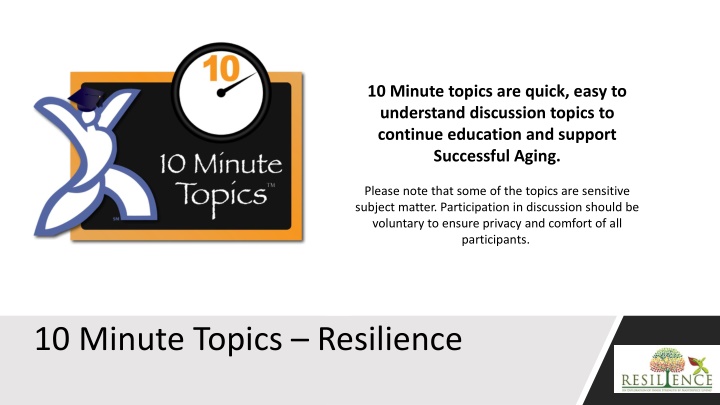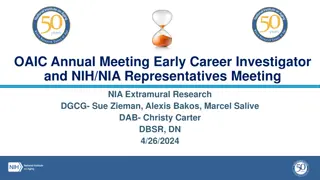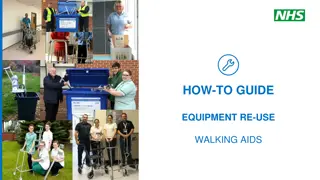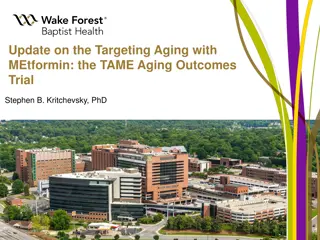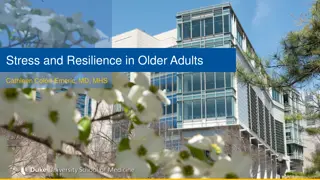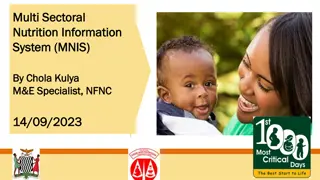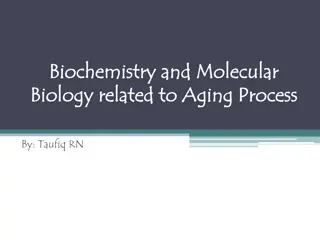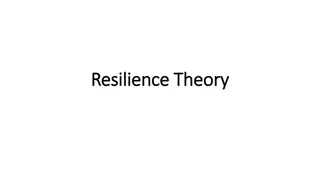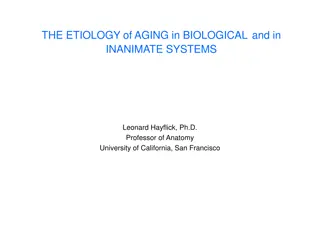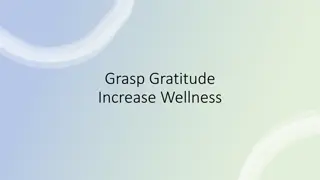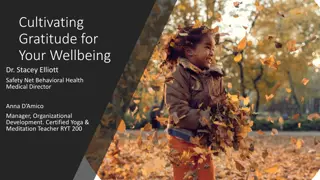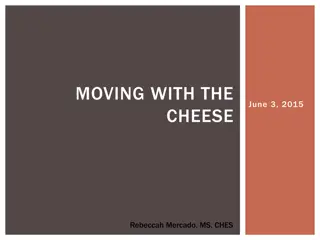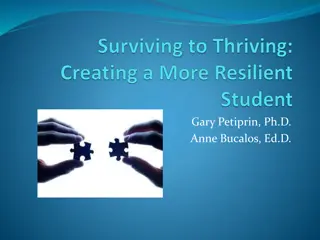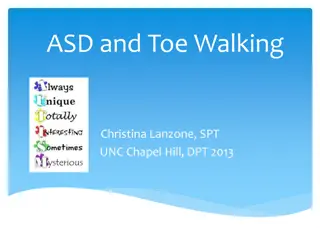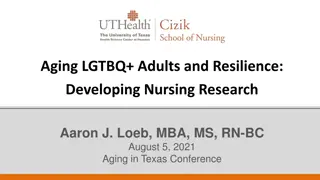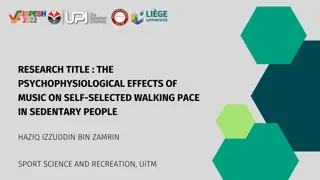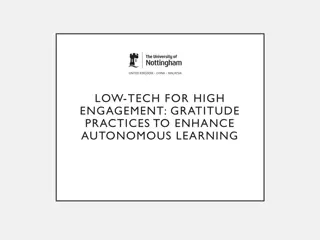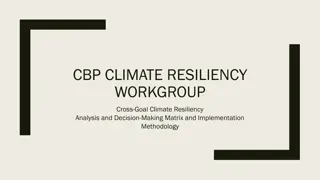Quick Tips for Successful Aging: Resilience, Gratitude, Resiliency, Walking, Nutrition
Explore topics like resilience, gratitude, resiliency, walking, and nutrition for successful aging. Discuss ways to cultivate gratitude, enhance resiliency, incorporate walking into daily routine, and prioritize nutrition as essential components of healthy aging.
Download Presentation

Please find below an Image/Link to download the presentation.
The content on the website is provided AS IS for your information and personal use only. It may not be sold, licensed, or shared on other websites without obtaining consent from the author.If you encounter any issues during the download, it is possible that the publisher has removed the file from their server.
You are allowed to download the files provided on this website for personal or commercial use, subject to the condition that they are used lawfully. All files are the property of their respective owners.
The content on the website is provided AS IS for your information and personal use only. It may not be sold, licensed, or shared on other websites without obtaining consent from the author.
E N D
Presentation Transcript
10 Minute topics are quick, easy to understand discussion topics to continue education and support Successful Aging. Please note that some of the topics are sensitive subject matter. Participation in discussion should be voluntary to ensure privacy and comfort of all participants. 10 Minute Topics Resilience
Gratitude Theory Gratitude is riches. Complaint is poverty. Doris Day Let us rise up and be thankful, for if we didn't learn a lot today, at least we learned a little, and if we didn't learn a little, at least we didn't get sick, and if we got sick, at least we didn't die; so, let us all be thankful. Buddha Research shows gratitude plays a big role in a person s sense of happiness. Gratitude is a feeling of thankfulness. Those who participate in gratitude exercises/activities reported higher levels of alertness, enthusiasm, determination, positivity, energy, and less depression and stress. ____________________________________________________ Discussion Questions: (Discuss the quotes above) What are some ways that you can show more gratitude to others? What aspects of your life are lacking in gratitude? How can we incorporate more gratitude into our community?
Resiliency Resiliency is the ability to positively cope and bounce back after failures, setbacks and other stressful events that happen in life. Examples of resiliency include death of a family member or close friend, divorce or separation, job change, accident or surgery, or another form of significant life change. Factors that contribute to resiliency include a strong support network of friends and family, good self-esteem, the belief you can overcome barriers and challenges, good problem- solving abilities, and effective communication/social skills. The more resources and strengths a person can draw from, the more resilient they will be when faced with a challenge. Additionally, factors of resiliency are not things people are born with, they are resources that can be acquired and learned by anyone. ___________________________________________________ Discussion Questions: When have you demonstrated resiliency in your life? What are some strong factors of resiliency that you already have? How can you build upon or add to your resiliency reserve to help you better cope and bounce back from future challenges?
Walking Walking is one of the simplest forms of physical activity that can be done anywhere, with anyone, and without cost. Walking is a simple activity that has important health benefits. Research shows that older adults who participate in regular walking increase muscle strength and improve their physical and mental health status. Walking has proven to improve flexibility and balance and decrease the risk of chronic disease. One way to get a routine going is to start a walking club in your community and invite others to join. ____________________________________________________ Discussion Questions: What are the benefits of walking? How can you get more walking in during your day? What are some of the barriers that prevent or discourage you from walking more?
Nutrition As we age, proper nutrition becomes very important. Research suggests that older adults metabolism slows down by as much as 30%, so limiting food intake as we age is important. However, older people must be careful to get the vitamins and nutrients they need. A modified food pyramid has been created especially for older adults (see handout). Also, it s important to know that thirst sensation decreases as we age, so proper hydration is important. Unless their doctors say otherwise, older adults should drink six glasses of water throughout the day whether they feel thirsty or not. No matter our age, a well-rounded diet gives us more energy, makes us feel better, prevents many diseases and improves our overall quality of life. __________________________________________________ Discussion Questions: What are some of the positive things about your current diet? What are some changes you could include in your diet to make it better-rounded? How can you share what you have learned about nutrition with others? (Brainstorm this question and encourage group and team members to talk to someone about what they have learned).
The Successful Aging Triad According to the book, Successful Aging, there are three things that have shown to contribute to successful aging: 1. Low risk of disease and disability 2. High physical and mental function 3. Active engagement with life, including having a network of friends as well as having meaning and purpose in life __________________________________________________ Discussion Questions: Can you think of someone who takes part in these three categories? What does their lifestyle look like? What about for you? What area are you strongest in? What category can you improve on? How can we promote these three things in our community?
Mentorship The International Council on Active Aging reported that people over 55 years who volunteered to assist school children with reading and classroom activities improved in brain function after four months. Additional results showed tutoring had even more benefits. At the beginning, both groups had little or no exercise. After three years, the women who tutored burned about twice as many calories as the non-volunteers. Anything that increases a level of activity for a long period of time is a huge plus, but the real news here is that this kind of volunteer work benefits children and the school system, as well as the volunteers, showing the potential benefits for what many are calling an "intergenerational social contract". __________________________________________________ Discussion Questions: How can you play a part in mentorship in our community or outside community? How can you share what you have learned about mentorship with others? (brainstorm this question and encourage group members to talk to someone about what they have learned and report back next meeting.)
Nature "Study nature, love nature, stay close to nature. It will never fail you." Frank Lloyd Wright (architect and philosopher) Take a walk, climb a mountain, or simply sit quietly outside. Doing these things benefits both the mind and the body. Spending time in nature provides an opportunity for you to clear your mind and get active. Being connected with nature has been linked to improving one s ability to heal after surgery and reduce anxiety. It has also been shown to help reduce stress.55 __________________________________________________ Discussion Questions: Discuss the quote above. What sort of activities do you enjoy that connect you with nature? How do you feel when you are in nature? What opportunities do you have to spend time in nature?
Intergenerational Programs Intergenerational programs are activities that bring people from at least two different generations together to interact. For example, an older adult and their children, or an older adult and their grandchildren, come together for a program or activity. Intergenerational programs benefit people, families, and the community. These activities bridge generational gaps, reduce negative aging attitudes and can offer a give and take relationship between all involved. The older generation benefits by passing along wisdom and knowledge. This gives older adults a sense of giving back as they offer guidance to future generations. __________________________________________________ Discussion Questions: What kind of intergenerational activities do you offer at our community? How could our community and group benefit by offering intergenerational programs? What benefits do you gain from interactions with other generations?
Preventing Chronic Disease Heart disease, cancer, stroke, certain lung diseases and diabetes are the leading causes of death in the world. They are called chronic diseases. In 2009, 7 out of 10 deaths in the U.S. were due to chronic diseases. More than 75% of fall health care costs are due to chronic conditions. Out of the 35 million people who died of chronic diseases in 2005, half were under the age of 70 and half were women. A Masterpiece lifestyle can help you avoid chronic disease and live a long, healthy life. Cheap and simple ways to live a healthy lifestyle that can prevent chronic disease includes a healthy diet, physical activity, avoiding too much alcohol, and quitting smoking. __________________________________________________ Discussion Questions: What are some things that you are currently doing to prevent chronic disease? What is one thing that you can add to your lifestyle that would help to combat chronic disease? What does a healthy lifestyle look like to you?
The Successful Aging Curve The successful aging curve shows usual aging (the solid line) and successful aging (the dotted line). Because of stereotypes and common beliefs, many people accepted the fact that they would slowly decline when they got older. But research shows that it s possible to maintain your health and function as you age, even late in life! __________________________________________________ Discussion Questions: What are you currently doing to stay on the high road to aging? What could you improve on now that would prevent the decline of the usual aging curve? How can we support others in taking the successful aging path?
Health Risks Sometimes we can be at risk for certain illnesses even if our lifestyle is very healthy. Factors that we cannot control may be to blame for putting us at risk, such as age, gender, race, or genetics. If you have a condition that runs in the family, there is a chance that you could be at a high risk for getting that condition. The best way to deal with this is to live a healthy lifestyle and be aware and educated about the condition. Schedule regular checkups with your doctor so that together you can monitor the situation carefully, and take advantage of preventative screening. Early detection is crucial. __________________________________________________ Discussion Questions: What are some health conditions that run in your family? How have you managed your risks? What are some of the ways our community supports you in managing your health risks?
Retirement Research shows that retirement age is different from country to country, but usually occurs between the age of 60 and 70. Most tend to think retirement age in the U.S. is 65, however, more and more Americans are working beyond the age of 65 and the time they can draw upon Social Security benefits. Some stay in the workforce full-time and some work with reduced hours. Retirement can be a challenge for some because their identity is defined by their jobs. __________________________________________________ Discussion Questions: What does your ideal retirement look like? What are you doing now to set yourself up for the ideal retirement? What have you learned from the group here about retirement?
Successful Aging Successful Aging is not just the difference between sickness and health, it is about being the best you can be throughout your entire life. __________________________________________________ Discussion Questions: What does successful aging mean to you? What about for your family, what would successful aging look like for them? What is your role in promoting successful aging?
Social Support, Giving When it comes to social support, it is good to give and to receive! Research has shown that those who provide social support enjoy increased self-esteem over time. Recipients of such support also enjoy health benefits, including a longer life, better, sharper brains and better immune function. When you can offer support for someone else, do so! It will be a win-win situation and both parties will benefit. __________________________________________________ Discussion Questions: What are some ways you can offer support to others? How can you inspire your peers to offer social support to others? What benefits have you received from offering emotional support to someone in the past?
The Village Concept A recent survey that was conducted on older adults perceptions of what a village is indicated that most believed it to be a small, close knit community of citizens where every person knows everybody else and has a relationship with those people. People of the village care for each other and help one another when appropriate. Every citizen within the village has an equal say and is on the same level socially and politically as every other citizen. When asked, these older adults would like their community to be more like a village. __________________________________________________ Discussion Questions: What is your vision of a village? How has Masterpiece Living contributed to making our community more of a village? What could you do to make our community seem like more of a village for you?
Social Support, Receiving As we experience challenges that come with aging, having a network of family and/or friends who can offer social support is important. In fact, receiving social support is important to our health and well-being as we age. Research shows that older adults who reported needing more emotional support also reported having poorer health compared with better health of those older adults who said they were satisfied with the emotional support that was being offered to them. So, offer social support when you can, and be open to receiving such support from others. It is good for your health! __________________________________________________ Discussion Questions: What is important to you about having social support from others? How often do you rely on social support from others to help you get through an issue or struggle? What are some ways that you can create more social support resources in your life?
Laughter Q: What do you call a cow that doesn t produce milk? A: A Milk Dud. (You know, like the candy.) Q: What runs but never walks? A: Water Have you tickled your funny bone lately? Laughter is a natural stress reliever. If that s not enough, laughter helps to fuel the body s organs as you breathe in more oxygen. This fuels your lungs and heart, and increases the feel-good hormones (endorphins) released into your brain. Laughter also improves circulation, helps muscles to relax, gives your immune system a boost, reduces pain, and of course it s just fun to have a good laugh! __________________________________________________ Discussion Questions: What type of humor do you enjoy? What makes you laugh easily? Who are your favorite comedians of your generation?
Social Connectivity How many people can you count on in your life? As people age, their social networks of family, friends, neighbors and co-workers change. One study found the most socially connected older adults were three times more likely to report very good or excellent health compared to those who were least connected. People who felt least isolated were five times more likely to report very good or excellent health than people who felt most isolated, regardless of their actual level of social connectedness. Social connections are critical to our health and well-being. __________________________________________________ Discussion Questions: What opportunities does our community offer to help stay socially connected? How do you stay socially connected both in the community and with your close family and friends?
Volunteerism Research shows that older adults who volunteer enjoy many benefits - for both themselves and their families. Those same older adults reported better overall health. Benefits from older adults volunteering also extend to the community in the way of helping local businesses and intergenerational relationships. The experience can also have spiritual meaning as well, giving the volunteer a sense of purpose in later life, giving back to the community and strengthening future generations. __________________________________________________ Discussion Questions: What volunteer work are you doing currently? What opportunities are available in and outside of our community? What organizations are particularly meaningful you? How can you encourage others to volunteer around the community?
Pets Dogs are not our whole life, but they make our lives whole. Roger Caras, Wildlife Photographer Dogs are often called man s best friend. Research shows that there are not only physical benefits of owning a pet, but also social benefits. Just spending time with a pet was shown to decrease loneliness in long-term care. Now, we have a good reason to play fetch with Fido. Even if you don t have your own pet, taking some time out to be with animals will lead to these benefits. __________________________________________________ Discussion Questions: Discuss the quote above. What are the benefits of being around pets? How does spending time with animals make you feel? What opportunities do you have to be around animals at our community?
Quick Tips These topics are meant to spark conversation among a group They are designed to be integrated into: Group meetings Community meetings Leadership meetings Town Halls And more! These are quick and efficient way to keep successful aging in the forefront of team members and residents' minds and to continually aid the community in applying the concepts they are learning. We encourage you to supplement the topics with news articles, additional information and exercises For References please refer to the 10 Minute Topics References document on the Masterpiece Living Website
